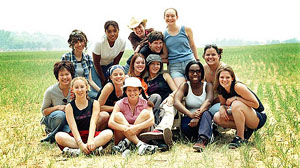Just as a quick exercise, I tried to think of all the women directors I could. Uh, Nora Ephron (Lucky Numbers), Penny Marshall (Riding in Cars with Boys) and Nancy Myers (Something's Gotta Give) were the only ones that came to mind. Smaller names like Kathryn Bigelow (K-19), Amy Heckerling (Loser) and Sofia Coppola (Lost in Translation) also appear. Then, Jodie Foster (Home for the Holidays) and Diane Keaton (Hanging Up) came to mind, but they got their through their acting. There are just not that many. Take a step into independent and foreign fare, and the names increase. Recent examples include Mira Nair (Vanity Fair), Margarethe von Trotta (Rosenstrasse), Jenniphr Goodman (The Tao of Steve), Clare Denis (Friday Night), Rakhashan Bani Etemad (Under the Skin of the City) and Samira Makhmalbaf (At Five in the Afternoon). Now, look at documentaries and the percentage of women directors is huge.
What was the point of the above list? Aside from blatant self-promotion, it just points out that there is a lack of equality of women behind the cameras in film, and writer/director Helena Lumme is concerned about this. I Wanna Be Everything focuses on three girls who attend Girls Film School, a summer program in New Mexico aimed at changing this. It is a women only program where the girls can learn about filmmaking, and have to direct a short film, in a single-sex environment. Lumme sidesteps the issue of whether single-sex education is good or bad, but that is fine because that is a whole other can of worms. I Wanna Be Everything takes a look at the experience of three girls during the camp. The one thing I disliked about her film is she tended to focus less on the three girls, Jessie Kahnweiler, Melanie Stewart, and Kimani Nagurski, and more on the Girls Film School. In fact, this short documentary sometimes feels like an extended commercial for the school, which isn't necessarily a bad thing.
It's just that these girls are so compelling, and I would have liked to have seen more of them on screen. Lumma spent time with each of them, going into their family lives and their hopes and dreams. With vastly different backgrounds, all three are hoping for the same thing. Lumme interviewed other girls, which is a little distracting because she rarely touches upon them again. I would have preferred if Lumme spent more time with the three and ditched the others. I was really happy with how Lumme caught up with them three months and one year after their experiences in New Mexico. It gives a sense of context to their experiences, and shows how differently they chose to take their paths. Although it begs the question on whether she selected the three at the onset of the film, or after the year passed.
